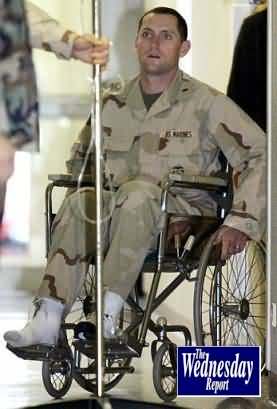
Mar | Apr | May | Jun | Jul | Aug
Picture came out bad.
http://www.nytimes.com/2004/09/08/politics/08policy.html?hp
U.S. Conceding Rebels Control Regions of Iraq
By ERIC SCHMITT and STEVEN R. WEISMAN
Published: September 8, 2004
ASHINGTON, Sept. 7 - As American military deaths in Iraq operations surpassed the 1,000 mark, top Pentagon officials said Tuesday that insurgents controlled important parts of central Iraq and that it was unclear when American and Iraqi forces would be able to secure those areas.

As of late Tuesday night, the Pentagon's accounting showed that 998 service members and three Defense Department civilians had been killed in Iraq operations.
Defense Secretary Donald H. Rumsfeld and Gen. Richard B. Myers, the chairman of the Joint Chiefs of Staff, said at a news conference that the American strategy in retaking rebel-held strongholds hinged on training and equipping Iraqi forces to take the lead.
Mr. Rumsfeld said Iraqi officials understood they must regain control of the insurgent safe havens. "They get it, and will find a way over time to deal with it,'' he said.

But General Myers said the Iraqi forces would probably not be ready to confront insurgents in those areas until the end of this year.

Their comments, which came after a two-day spike in violence in Iraq led to a surge in American military deaths, represented an acknowledgment that the Americans had failed to end an increasingly sophisticated insurgency in important Sunni-dominated areas and in certain Shiite enclaves. Fighting raged on Tuesday in Sadr City, in Baghdad, as Shiite militiamen loyal to Moktada al-Sadr ended a self-declared cease-fire. [Page A14.]

The officials' assessment also underscored the difficulty of pacifying Iraq in time for elections scheduled for January. The cities of greatest rebel control are Ramadi, Falluja, Baquba and Samarra, in the so-called Sunni triangle, west and north of Baghdad, where Saddam Hussein remains popular and many forces loyal to him have gathered strength.

There is increasing concern in the administration over plans for the election, with some officials saying that if significant parts of the Sunni areas cannot be secured by January, it may be impossible to hold a nationwide balloting that would be seen as legitimate. Putting off the elections, though, would infuriate Iraq's Shiite majority. The elections are for an assembly that is to write a new constitution next year. Mr. Rumsfeld warned that the violence would intensify as elections approached.

Mr. Rumsfeld said that Prime Minister Ayad Allawi recognized that his government could not continue to allow rebel control in crucial areas of the country, but that it would take time for him to determine how to proceed.

"The prime minister and his team fully understand that it is important that there not be areas in that country that are controlled by terrorists," he said, adding that Dr. Allawi would deal with the problem by "negotiation and discussion" in some cases and by force in others.
Other administration officials, amplifying the secretary's comments, said the administration had decided to let Dr. Allawi try to persuade rebel leaders to join the process of reconstructing Iraq, or suffer the consequences if they did not.

"Allawi's strategy is to try to find people on the sidelines and wean the moderates away, to give them courage and a hope of reward for themselves," said an administration official. "He's telling them: 'I'm giving you an opportunity to meet your local concerns. You're going to be my guy, and together we'll try to isolate the extremists.' "
Administration officials say no decision has been made yet for American forces to attack those strongholds. The preference is for Iraqi forces to do the job, as they were said to have been poised to do last month in Najaf, the Shiite holy city.
But the record of the Iraqi security forces has not been inspiring, although some Iraqi forces fought well in Najaf, American officials said. While 95,000 soldiers have been trained and equipped up to American commanders' satisfaction, General Myers said, they will not be ready until the end of the year to join American forces in any assault against insurgent strongholds and then keep the peace afterward.


